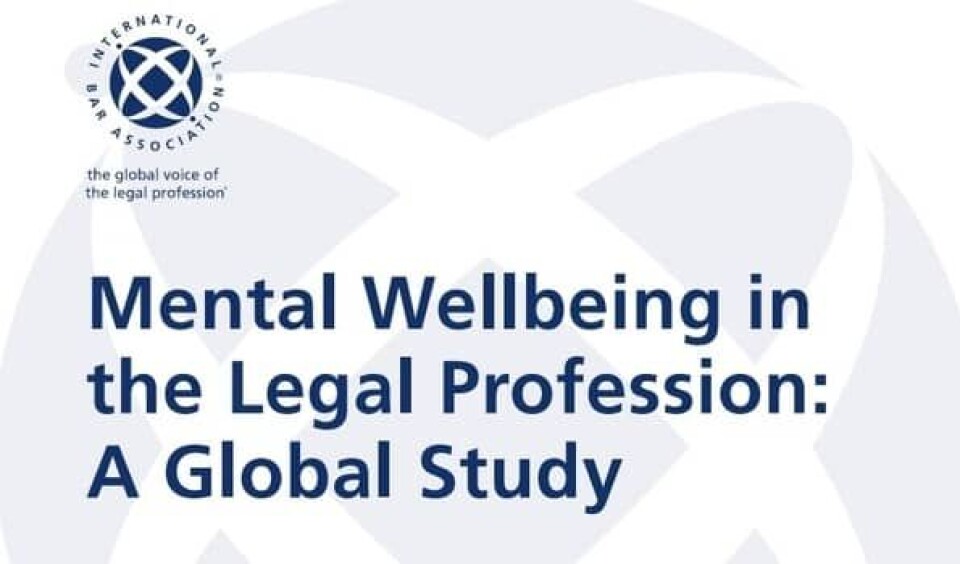Copyright : Re-publication of this article is authorised only in the following circumstances; the writer and Africa Legal are both recognised as the author and the website address www.africa-legal.com and original article link are back linked. Re-publication without both must be preauthorised by contacting editor@africa-legal.com
Global Crisis in Lawyer Mental Wellbeing

One in ten young lawyers worldwide experience suicidal thoughts, and yet the mental wellbeing of lawyers is seldom top of any agenda. The International Bar Association (IBA) is trying to change that with the recent release of its report titled “Mental Wellbeing in the Legal Profession: A Global Study”, reports Sheena Carnie.
“The profession fulfils me with purpose and a sense of achievement, however, the permanent pressure, fear of failure, constant battle between work and private/family life is extremely stressful and has a negative impact on my mental wellbeing,” reads a quote in the report from a female solicitor/attorney based in Switzerland.
“The constant stress and pressure of deadlines and pressure to bill hours do not stop at the end of the work day. I struggle to shut off the work part of my brain. The stress is always there in the background,” said a male barrister from Canada.
One in three people surveyed said their work has a negative or extremely negative impact on their wellbeing. This is a global phenomenon, and in terms of regions it was respondents in the North American Regional Forum who experienced the most issues across the board. However, the IBA report revealed that African lawyers suffered the second highest level of fatigue among legal workers globally, said Isibor Aigbe, one of the International Bar Association’s Mental Wellbeing Task Force heads who is based in Nigeria.
When asked if he thought there was a reason for this, Aigbe commented, “Lawyers are affected to a large degree by the nuances in their localities … Nigeria, for example, has a high power culture that leads to the internalisation of masculine norms among men. Unfortunately, this harmful social construction and cultural expectation of role theories has permeated the legal profession. The embodiment of these masculine norms affects the mental health of men in Nigeria and probably other parts of West Africa.”
Although the report reveals that firms and organisations are increasingly acknowledging the importance of mental wellbeing, Aigbe said that “There is no known support system set up solely for the purpose of promoting the mental wellbeing of legal professionals in Nigeria.”
Worse still, he said, “The attitudes of some law firms is borderline mental abuse and the staff are not aware of their rights. Stigma is a major problem: it is very difficult for practitioners and students to acknowledge they may have problems and seek help without worrying that it will damage their career or livelihoods.”
According to the survey, individual legal professionals want firms and organisations to retain changes in working practices necessitated by the pandemic, such as virtual meetings, less travel, working from home and flexible hours.
One encouraging sign is that, according to the report, “individual legal professionals employ a range of healthy and appropriate self-care mechanisms … including exercising, taking breaks and other therapies. Only a small minority are lacking in self-care techniques and/or accessing potentially unhealthy coping mechanisms, such as alcohol and recreational drug use.”
Practical steps need to be taken to foster a working culture where mental health is prioritised. The report explains that “A simple first step for all sections of the profession in achieving change is the adoption of a mental wellbeing policy”.
Aigbe says legal organisations and firms need to recognise intersectionality. “The difficulties experienced by specific groups, including younger, female, ethnic minority, and legal professionals with disabilities, must be better understood and acknowledged by the legal community.”
He says these entities also need to support staff to seek help for physical health when needed without shame, and must address systemic problems. “For mental wellbeing in the legal profession to improve, the underlying and fundamental causes must be addressed. These include, amongst others, poor or non-existent managerial training; bullying, harassment, sexism and racism; and a culture of unsustainable working hours and high billing targets, particularly for junior members of the profession.”
To read the full report click here.
To join Africa Legal's mailing list please click here
